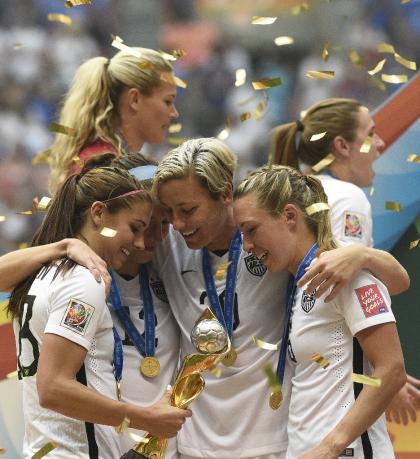Winners and losers from the 2015 Women's World Cup

And just like that, it’s over.
[FC Yahoo: USWNT players share their World Cup celebration (Photos)]
The 2015 Women’s World Cup has come to an end and the United States became the first nation to win its third World Cup. Of course, the U.S. is the ultimate winner for hoisting its first golden trophy in 16 years, but here are a few other winners — and losers — from a month’s worth of women’s soccer.
WINNERS
Carli Lloyd: Few players had a more dramatic turnaround. She made early headlines after former U.S. coach Pia Sunhage essentially called her an emotional head case in the New York Times, but she rallied, scored six goals in the Americans' final four games, including a hat trick in the final against Japan. For her effort she was awarded the Golden Ball, which is given to the best player of the tournament. Pretty sure Lloyd won’t be paying for anything anywhere in America for quite some time.
England: Outside of the U.S., no team came into its own more than England. The Three Lionesses came into the tournament as the world’s No. 6 team but had never won a game outside of the group stage. After initial struggles against France, England used its bunker style to reach the semifinals where it suffered a heartbreaking loss against Japan after scoring an own goal in the 92nd minute. Still, Mark Sampson's side rallied to beat Germany in the third-place game.

Abby Wambach:
She announced after group play that this would be her final World Cup, which put added pressure on her and her teammates to win a title before she rode off into the sunset. Wambach is widely regarded as one of the best to ever play the women’s game. However, she now doesn’t have the dreaded asterisk of being one of the best that never won a World Cup title.
Australia: A young squad made a bold statement with a dramatic win against Brazil in the round of 16 before succumbing to Japan in the quarterfinals. Still, the Matildas definitely piqued the interest of their country and the world. Watch out for this team in 2019.
Jill Ellis: It’s time for us all to admit that we were wrong about the U.S. coach. She’s far smarter than we gave her credit. She knew all along what her team was capable of and, despite an entire nation questioning her decisions, Ellis had the United States peaking at the perfect moment and hoisting the World Cup trophy for the first time in 16 years.
LOSERS
Artificial turf: Despite the success of this tournament, there was nothing good about the fake grass. The turf was hot, it was pebbly and it changed the way the game had to be played. Soccer on the world stage should never be played on an artificial surface and hopefully it won’t ever again.
Ayumi Kaihori: England’s Laura Bassett was able to rebound from her own goal with a bronze medal. Kaihori, Japan's goalkeeper, won’t have such luck. She was under a U.S. offensive barrage early in the game, but it was Carli Lloyd’s 54-yard goal that will be her lasting memory. Lloyd caught Kaihori creeping off her line and, from the halfway line, chipped the ball perfectly over her head. Kaihori will have to wait four years to erase that image.

Brazil:
Its best chance to win the Women's World Cup was probably in 2011, but the 2015 Brazil team started just as hot. The Brazilians looked dominant through the group stage, but allowed a spunky Australia team to oust them from the tournament. Marta might be one of the best players ever, but with no title, she’ll never be held in the highest regard.
Great Britain's FAs: England, as noted above, was one of the biggest surprises of the tournament. Unfortunately, this will be the last time the world sees that squad until the next World Cup. Thanks to some fighting within the football associations of Great Britain, there will be no Great Britain representative in the Olympics next year. Way to not capitalize on that momentum, Great Britain.
Sweden: No team was a bigger flop than Sweden. It failed to win a game during the tournament and its best game came when it tied the Americans 0-0 in the second game of group play (not a bad result now that the tourney is over). Pia Sundhage left the United States to lead her home nation to the mountain top, but her team’s performance was the most disappointing of the tournament.
FIFA officiating: FIFA tried to make a statement by having all female officials during the World Cup, but most of those officials didn’t have the experience to be officiating at a World Cup level. Consequently, the games either had too many calls or too few calls and, more often than not, calls that ultimately decided the outcomes of games. However, the pinnacle of bad officiating came during the third-place game between England and Germany, where nothing was called and a fight nearly erupted.
-----
Want to read my in-game ramblings about soccer? Follow Graham Watson on Twitter @Yahoo_Graham


